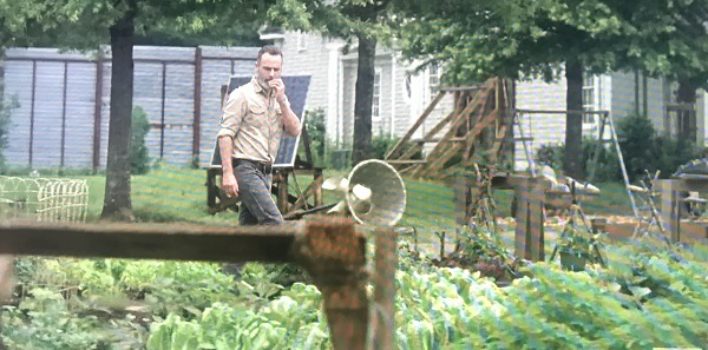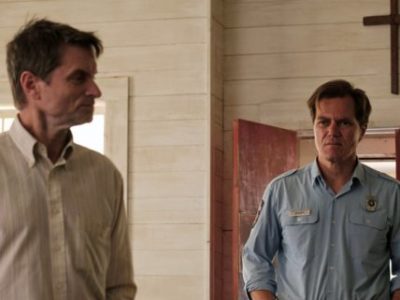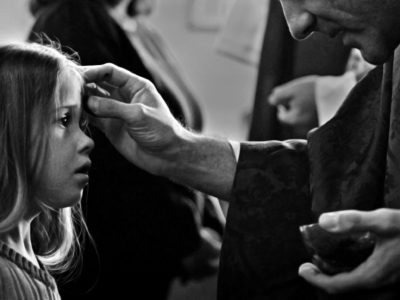The Walking Dead S9E3: Warning Signs
I realized last night that The Walking Dead is like golf. At least for me. When I have tried to golf I get frustrated to no end with drive after drive slicing three fairways over. But then, about every 7th or 8th drive, it’s a thing of beauty. For the last few years, this has been my experience with The Walking Dead. A string of moderate to crummy episodes, then a terrific one. Last night was one of those.
I’m also a big fan of contrast, which I think is best used when it can ramp into chaos or meaningful deception. After Warning Signs opened with the reveal that Justin had been intentionally murdered and became a walker, we’re given a pristine shot of current life for the Alexandrian community. Solar power is intact, crops are plentiful, and a sense of normalcy has returned inside the walls. Rick plays with Judith and talks with Michonne about the future. Hope is alive and well. Trouble is brewing, however.
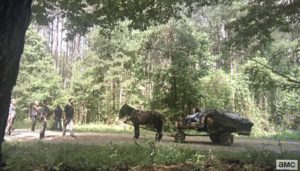 After Jud and other saviors have an uncomfortable visit with Maggie while she’s transporting food, the fate of Justin is discovered and two communities clash. Certain members of the savior community continue to go missing. Combined with Justin’s death, this brings the distrust and uneasiness of the saviors to a boiling point as they demand weapons to protect themselves.
After Jud and other saviors have an uncomfortable visit with Maggie while she’s transporting food, the fate of Justin is discovered and two communities clash. Certain members of the savior community continue to go missing. Combined with Justin’s death, this brings the distrust and uneasiness of the saviors to a boiling point as they demand weapons to protect themselves.
The contrast in Warning Signs is occurring on two levels; externally when Alexandria is juxtaposed against what’s brooding under the surface, and philosophically when two means of enacting justice are pitted against one another. The external contrast can be extrapolated onto numerous things; class warfare, treatment of the impoverished, personal protection rights, etc. Some of these are more reasonable and warranted by the content than others, but the philosophical battle of the episode is what interests me the most. Rick sides with mercy. His entire arc of season eight relies on mercy overcoming his wrath, specifically in light of the impact of Carl’s death. He has determined that “building life, not taking it”, is the best way to honor those they have lost. But he’s not the only one with a claim to wrath against Negan.
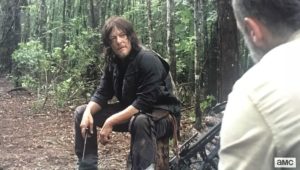 In a display of these two philosophies butting heads, Rick pleads with Daryl to remember the forgiveness he once showed to a man who left his brother to die on a rooftop (referring, of course, to himself). This gives Daryl pause. You can see the conflict within him as his anger rules over his actions but his heart is swayed to consider Rick’s request. We begin to see how the influence of Negan remains a factor not just in the angst and aggression of the saviors, but in the desire for revenge and justice from other communities. Within Rick’s original group, Daryl and Maggie have agreed to eventually get revenge on Negan. Even Carol, who is their self-appointed guardian on Rick’s behalf, was ready to draw a gun on them during the skirmish. But Maggie’s actions are what has sent a ripple effect across the entire community.
In a display of these two philosophies butting heads, Rick pleads with Daryl to remember the forgiveness he once showed to a man who left his brother to die on a rooftop (referring, of course, to himself). This gives Daryl pause. You can see the conflict within him as his anger rules over his actions but his heart is swayed to consider Rick’s request. We begin to see how the influence of Negan remains a factor not just in the angst and aggression of the saviors, but in the desire for revenge and justice from other communities. Within Rick’s original group, Daryl and Maggie have agreed to eventually get revenge on Negan. Even Carol, who is their self-appointed guardian on Rick’s behalf, was ready to draw a gun on them during the skirmish. But Maggie’s actions are what has sent a ripple effect across the entire community.
Her decision to hang Gregory was a sign to everyone (whether intentional or not) that Rick’s rules are not the only rules. In the search for some of the missing saviors, Maggie and Daryl come across members of Oceanside holding a savior at gunpoint, ready to execute. This is a powerful scene as it reminds us all of the impact felt when men turn against one another to manipulate, abuse, murder, and enslave. Cyndie tells of how the saviors killed every male in their community, and how this savior (Arat, now white hair symbolizing her change of heart) specifically killed her 11-year old brother, laughing as he wept and she begged for his life. This testimony is enough to influence Maggie and Daryl to turn their backs and allow this.
 Mercy, or wrath. We might have thought that mercy won the day at the end of season eight, but wrath, it seems, with have its day. I call it wrath, but it might just as easily be called revenge. I suppose the distinction between those words and which one may choose to describe the actions of Maggie or Oceanside all boils down to your stance on capital punishment. Whereas Negan killed out of a show of power and as a penalty for disobedience, Maggie and Oceanside have used death as a punishment for crimes of equal measure. Yet, they enact this punishment as individuals rather than as a community with agreed upon standards. It appears this may be the key to the distinction between revenge and justice.
Mercy, or wrath. We might have thought that mercy won the day at the end of season eight, but wrath, it seems, with have its day. I call it wrath, but it might just as easily be called revenge. I suppose the distinction between those words and which one may choose to describe the actions of Maggie or Oceanside all boils down to your stance on capital punishment. Whereas Negan killed out of a show of power and as a penalty for disobedience, Maggie and Oceanside have used death as a punishment for crimes of equal measure. Yet, they enact this punishment as individuals rather than as a community with agreed upon standards. It appears this may be the key to the distinction between revenge and justice.
Never pay back evil for evil to anyone. Respect what is right in the sight of all men. If possible, so far as it depends on you, be at peace with all men. Never take your own revenge, beloved, but leave room for the wrath of God, for it is written, “Vengeance is Mine, I will repay,” says the Lord. –Rom. 12:17-19
Rare is the episode where the above verse cannot be cited, but it seems especially appropriate now. Hints at a law or agreed upon rules of conduct between communities have been dropped in each of this season’s first three episodes. The people are longing for some type of governing authority to adjudicate certain violations. If we read onto Romans 13, it would appear that such governing authorities arranged by God in order to bring wrath (punishment, justice) on the one who does evil. Whether this looks like capital punishment or not can be another discussion, but suffice it to say the people are seeking direction. Maggie and Daryl seem dead-set on inflicting their wrath on Negan before anything like that can happen and they are potentially handcuffed by the law.
My Rating: A+
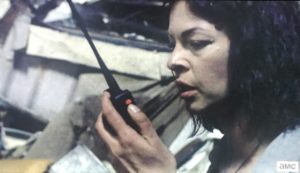 All that talk of mercy and wrath and contrast and I didn’t even mention the major development with Jadis and Gabriel! This episode had depth, intrigue, and forward momentum across the board. We know a major conflict in ideology is coming, and Jadis’ radio discussion with whomever is in control of that helicopter has me personally excited for the expansion of this known world and how it may influence this community at such a crucial time. Not to mention Jadis’ terminology of “an A or a B” type of person. Whatever it is, I don’t think Gabriel will like his “A” classification.
All that talk of mercy and wrath and contrast and I didn’t even mention the major development with Jadis and Gabriel! This episode had depth, intrigue, and forward momentum across the board. We know a major conflict in ideology is coming, and Jadis’ radio discussion with whomever is in control of that helicopter has me personally excited for the expansion of this known world and how it may influence this community at such a crucial time. Not to mention Jadis’ terminology of “an A or a B” type of person. Whatever it is, I don’t think Gabriel will like his “A” classification.


